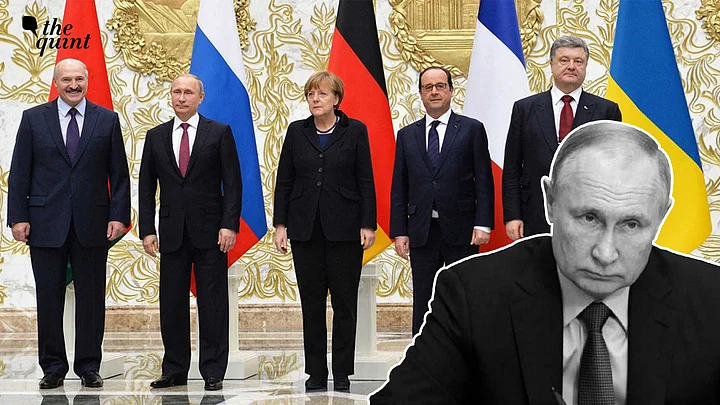As Ukraine woke up to sounds of explosions across the country and stories of shelling in the eastern part of the country on Thursday, 24 February, conversations around the Minsk accords (2014-15) have reignited.
The agreements that eased fighting in the Donbas region have been blatantly violated by Russia's actions in eastern Ukraine.
Brokered by France and Germany to end the fighting in the Donbas region (the separatist enclaves of Donetsk and Luhansk), Minsk I and II were hailed as a pathway to peace in Eastern Europe.
What are these accords? What was promised by those party to it? How has Russian President Vladimir Putin violated the agreements by sending in troops into the Donbas region? What happens next, now that the whole framework for peace has been destroyed?
Build Up to Minsk
A few weeks after Russia annexed Crimea in 2014, government buildings in Donetsk and Luhansk were taken over pro-Russia separatist groups.
Both enclaves declared independence in April 2014. A referendum was held on 11 May to declare freedom from Ukraine.
They then became the self-proclaimed "Donetsk People’s Republic" and the "Luhansk People’s Republic" and regarded themselves as "Novorossiya" (New Russia).
Ukraine fought back, and its military went on the offensive to reclaim Donetsk and Luhansk.
The rebels, unofficially aided by Russian reinforcements from across the border, retaliated hard, and more than 14,000 people were killed in the fighting that ensued.
France and Germany intervened to de-escalate the conflict, which led to a ceasefire and peace agreement known as Minsk I (September 2014) and Minsk II (February 2015).
The rebels were left with de facto control of around one-third of the Donbas, the Ukrainian military controlled the rest.
Minsk I and Minsk II
Ukraine and pro-Russia separatists reached a 12-point ceasefire agreement in the capital city of Belarus, Minsk in September 2014.
Some of the requirements of the accords included
Exchange of prisoners
Withdrawal of 'armed formations, military equipment and fighters and mercenaries' from Ukraine
A 'security zone' along the Eastern Ukraine border monitored by the Organization for Security and Co-operation in Europe
Humanitarian aid and an economic reconstruction programme for Donbas
The accords also said that local elections will be held in Donbas in accordance with Ukrainian law, leading to the decentralisation of power in the region.
The agreement, however, fell on deaf ears. Bloodshed resumed, and parties were drawn to the negotiating table again.
That's when Minsk II, a 13-point ceasefire agreement was agreed upon.
Just like the previous protocol, it consisted of prisoner swaps, amnesties, security monitoring, and humanitarian aid.
Clause number four was a significant one. It read:
"Launch a dialogue, on day 1 of the withdrawal, on modalities of local elections in accordance with Ukrainian legislation and the Law of Ukraine. On interim local self-government order in certain areas of the Donetsk and Luhansk regions as well as on the future regime of these areas based on this law."
The most important clause, however, was clause 9, that aimed at "the reinstatement of full control of the state border by the government of Ukraine throughout the conflict area, starting on day 1 after the local elections."
Russia's Blatant Violations
While clause 9 has been blatantly violated by Putin's latest actions in Donbas, his "special operation" to "de-militarise" the region, has effectively ended any chances of self-government within the ambit of Ukrainian law (clause 4 of Minsk II).
It is not just his military policy. His decision to recognise the "Donetsk People's Republic" and the "Luhansk People's Republic" as independent from Ukraine has also violated the Minsk accords (since certain areas both enclaves were supposed to move towards self-governance under Ukrainian law).
With instances of shelling by Russia being reported in the region, it has, along with its proxies, violated the ceasefire as well, which was clause number 1 in both Minsk I and Minsk II.
Clause number 10 of both agreements promised the "Withdrawal of all foreign armed formations, military equipment, as well as mercenaries from the territory of Ukraine under monitoring of the OSCE. Disarmament of all illegal groups."
That has also been thrown out of the window.
Not much is left for Putin to violate, given that Russia has violated international law by breaching Ukraine's sovereignty.
What Next?
What is left to see is how far is Putin willing to go.
He has stated that Russian forces won't occupy Ukrainian territory. Internationally, Donbas continues to be recognised to be a part of sovereign Ukraine.
The problem is that Putin doesn't consider Donbas and Crimea to be Ukrainian territory at all.
Now that the legitimacy of Minsk II has been completely shattered, Putin has a variety of options on how to proceed with his aggressive plans for Ukraine.
He may use the Crimea playbook in Donbas. Now that troops have entered the region, expect a referendum to be held soon, which overwhelmingly votes to become a de facto federal subject of Russia.
"Then, maybe, there will be a local military operation to extend their territory up to their pre-2014 boundaries", Vladimir Pastukhov, a senior researcher at the University College London told The BBC.
"If he's allowed to play the game by his rules, he will do this for as long as possible. He will cook the meat on a slow fire", he added.
The other option is further advancing into Ukraine. Putin can do that via Belarus from the north where he has a large numbers of troops stationed.
He can also invade from the south, that is, from Crimea. The assault from the east has already started.
Putin knows that he has breached the Minsk protocol with his actions in Donbas.
That deal cannot, anymore, deter him from advancing further into Ukraine, if it ever did in the first place.
Time will only tell whether or not he has plans to siege Kyiv.
